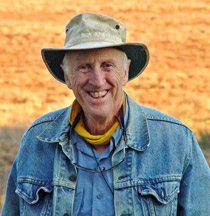
Climate change is real, its challenges huge, and people and nations must collaborate to lessen its effects, says Stewart Brand, founder of the "Whole Earth Catalog" in the 1960s and author of "Whole Earth Discipline: An Ecopragmatist Manifesto" published in 2009.
Brand will deliver the fourth Heuermann (pronounced Hugh-er-man) Lecture at 7 p.m. Tuesday, Jan. 17 at Hardin Hall, 33rd and Holdrege in Lincoln. The lecture is free and open to the public.
Heuermann Lectures in the Institute of Agriculture and Natural Resources at the University of Nebraska-Lincoln focus on meeting the world's growing food and renewable energy needs while sustaining natural resources and rural communities.
A self-described lifelong environmentalist and professional futurist, Brand's topic is "Green Ag Biotech." He'll discuss the use of biotechnology in agriculture to help feed the world and improve the environment.
"Agriculture can be a conscious leader in fighting climate change," Brand said, because biotechnology in agriculture can increase production while engineering ecology values, such as drought tolerance, into seeds.
For those who dispute climate change, "It gets easier every month to make the climate case," Brand said. "The data gets better and the news gets worse."
Worldwide, climate change, urbanization and biotechnology are having major lasting effects on the planet, Brand said, and for some require hard ideological shifts -- hard because those shifts in thinking mean reversing long-held opinions.
Brand himself has gone from distrusting nuclear power and genetically modified organisms -- he prefers the term genetically engineered -- to embracing both to help deal with the serious effects of people-caused climate change.
While the first 15 to 20 years of genetically engineered crops were very specific, usually the products of private industry selling herbicide-tolerant, pest-resistant seed, Brand said, he sees genetic engineering moving quickly now, and believes it will be distributed much more outside initial developers, causing much discussion in the next decade.
Brand said he believes the leading edge of genetic engineering will occur in the developing world, with countries looking to feed their populations and increase cash crops. He noted China has committed $4 billion to developing genetically engineered crops.
Biotechnology in agriculture can have huge effects on climate change, Brand said, citing herbicide-resistant soybeans that, because of their genetic engineering, don't require tillage which reduces greenhouse gas emissions.
"I daresay the environmental movement has done more harm with its opposition to genetic engineering than with any other thing we've been wrong about," Brand wrote in "Whole Earth Discipline." "We've starved people, hindered science, hurt the natural environment, and denied our own practitioners a crucial tool."
Said Ronnie Green, University of Nebraska vice president and Harlan vice chancellor, IANR, "We know with the world's constantly growing population that one of the biggest challenges facing us today is how to provide security -- and by that I mean enough to sustain us all, all around the world -- in the areas of food, natural resources, energy, communities and people.
"In his book 'Whole Earth Discipline,' Stewart Brand describes himself as a man with opinions that are 'strongly stated and loosely held' -- strongly stated so people can get hold of them to think about, and loosely held so facts and persuasive argument can change them," Green continued. "With his lifetime of experience as an ecologist and internationally known voice in the environmental movement, I look forward to the perspective and discussion he brings the Heuermann Lectures."
Founder, editor and publisher of the first "Whole Earth Catalog" in 1968, Brand is co-founder and president of The Long Now Foundation, which works to make long-term thinking more common as a counterpoint to today's accelerating culture. He also co-founded and works for Global Business Network, which helps clients address critical challenges and gain what they need to shape the future.
He is the author of "Two Cybernetic Frontiers"; edited and published "Whole Earth Epilog"; edited "Space Colonies"; co-edited "Soft Tech"; edited and published "The Next Whole Earth Catalog"; co-edited "News that Stayed News"; authored "The Media Lab: Inventing the Future at MIT"; authored "How Buildings Learn: What Happens After They're Built"; authored "The Clock of the Long Now: Time and Responsibility"; and "The SALT Summaries," done in 2011 on Kindle.
He is the subject of two books -- "From Counterculture to Cyberculture: Stewart Brand, the Whole Earth Network, and the Rise of Digital Utopianism," and "Counterculture Green: The Whole Earth Catalog and American Environmentalism."
Heuermann Lectures are made possible by a gift from B. Keith and Norma Heuermann of Phillips, long-time university supporters with a strong commitment to Nebraska's production agriculture, natural resources, rural areas and people.
-- Judith Nelson, IANR communications specialist
More details at: http://go.unl.edu/nb4